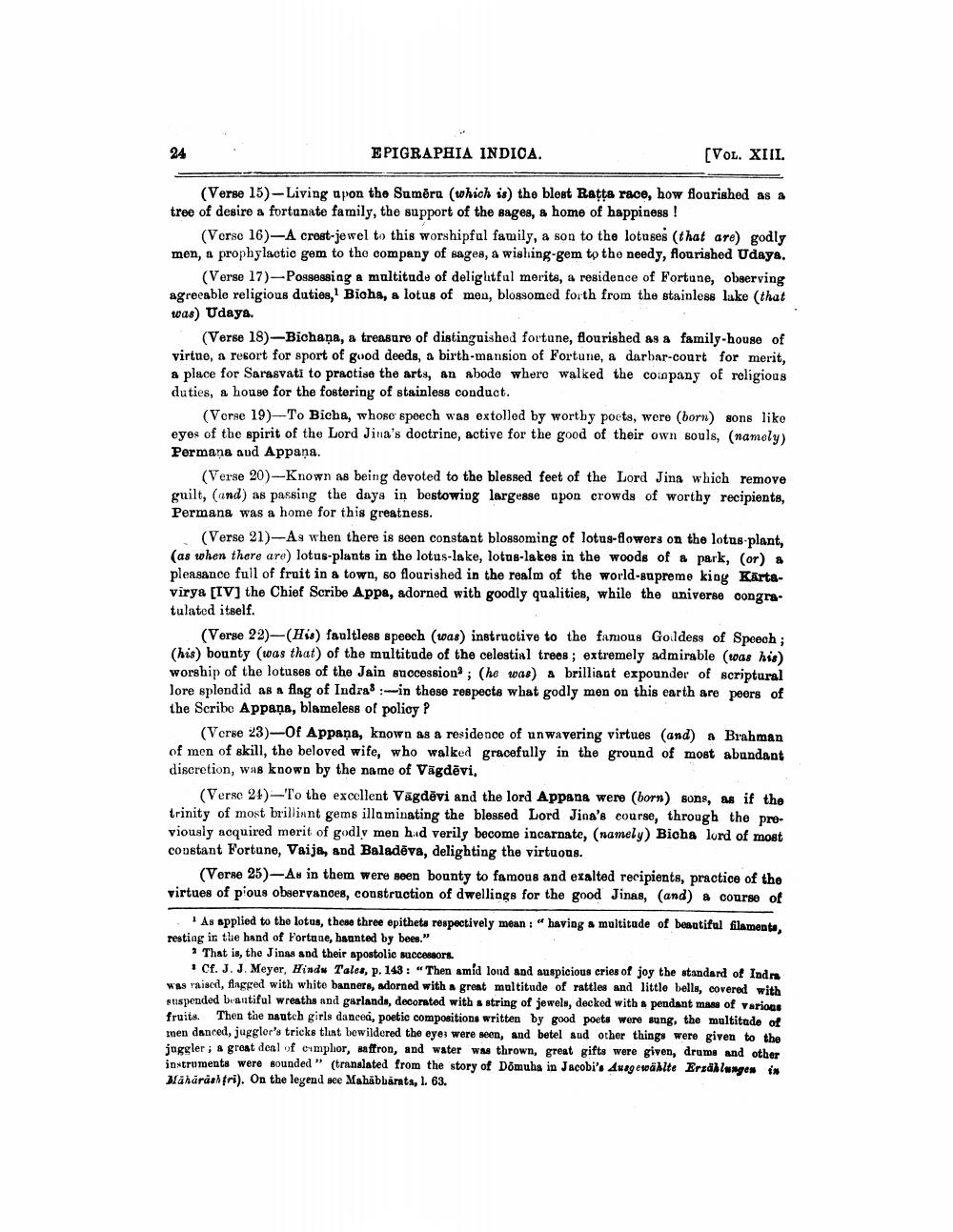________________
24
EPIGRAPHIA INDICA.
[VOL. XIII.
(Verse 15)-Living upon the Sumeru (which is) the blest Raṭṭa race, how flourished as a tree of desire a fortunate family, the support of the sages, a home of happiness!
(Verse 16)-A crest-jewel to this worshipful family, a son to the lotuses (that are) godly men, a prophylactic gem to the company of sages, a wishing-gem to the needy, flourished Udaya.
(Verse 17)-Possessing a multitude of delightful merits, a residence of Fortune, observing agreeable religious duties,1 Bicha, a lotus of men, blossomed forth from the stainless lake (that was) Udaya.
(Verse 18)-Bichana, a treasure of distinguished fortune, flourished as a family-house of virtue, a resort for sport of good deeds, a birth-mansion of Fortune, a darbar-court for merit, a place for Sarasvati to practise the arts, an abode where walked the company of religious duties, a house for the fostering of stainless conduct.
(Verse 19)-To Bicha, whose speech was extolled by worthy poets, were (born) sons like eyes of the spirit of the Lord Jina's doctrine, active for the good of their own souls, (namely) Permana and Appana.
(Verse 20)-Known as being devoted to the blessed feet of the Lord Jina which remove guilt, (and) as passing the days in bestowing largesse upon crowds of worthy recipients, Permana was a home for this greatness.
(Verse 21)-As when there is seen constant blossoming of lotus-flowers on the lotus-plant, (as when there are) lotus-plants in the lotus-lake, lotus-lakes in the woods of a park, (or) a pleasance full of fruit in a town, so flourished in the realm of the world-supreme king Kartavirya [IV] the Chief Scribe Appa, adorned with goodly qualities, while the universe congratulated itself.
(Verse 22)-(His) faultless speech (was) instructive to the famous Goldess of Speech; (his) bounty (was that) of the multitude of the celestial trees; extremely admirable (was his) worship of the lotuses of the Jain succession; (he was) a brilliant expounder of scriptural lore splendid as a flag of Indra3:-in these respects what godly men on this earth are peers of the Scribe Appana, blameless of policy?
(Verse 23)-Of Appana, known as a residence of unwavering virtues (and) a Brahman of men of skill, the beloved wife, who walked gracefully in the ground of most abundant discretion, was known by the name of Vāgdēvi,
(Verse 24)-To the excellent Vagdevi and the lord Appana were (born) sons, as if the trinity of most brilliant gems illuminating the blessed Lord Jina's course, through the previously acquired merit of godly men had verily become incarnate, (namely) Bicha lord of most constant Fortune, Vaija, and Baladeva, delighting the virtuous.
(Verse 25)-As in them were seen bounty to famous and exalted recipients, practice of the virtues of pious observances, construction of dwellings for the good Jinas, (and) a course of
1 As applied to the lotus, these three epithets respectively mean: " having a multitude of beautiful filaments, resting in the hand of Fortune, haunted by bees."
That is, the Jinas and their apostolic successors.
Cf. J. J. Meyer, Hindu Tales, p. 143: "Then amid lond and auspicious cries of joy the standard of Indra was raised, flagged with white banners, adorned with a great multitude of rattles and little bells, covered with suspended beautiful wreaths and garlands, decorated with a string of jewels, decked with a pendant mass of various fruits. Then the nautch girls danced, poetic compositions written by good poets were sung, the multitude of men danced, juggler's tricks that bewildered the eyes were seen, and betel and other things were given to the juggler; a great deal of camphor, saffron, and water was thrown, great gifts were given, drums and other instruments were sounded" (translated from the story of Domuha in Jacobi's Ausgewählte Erzählungen in Mähäräshtri). On the legend see Mahabharata, 1. 63.




